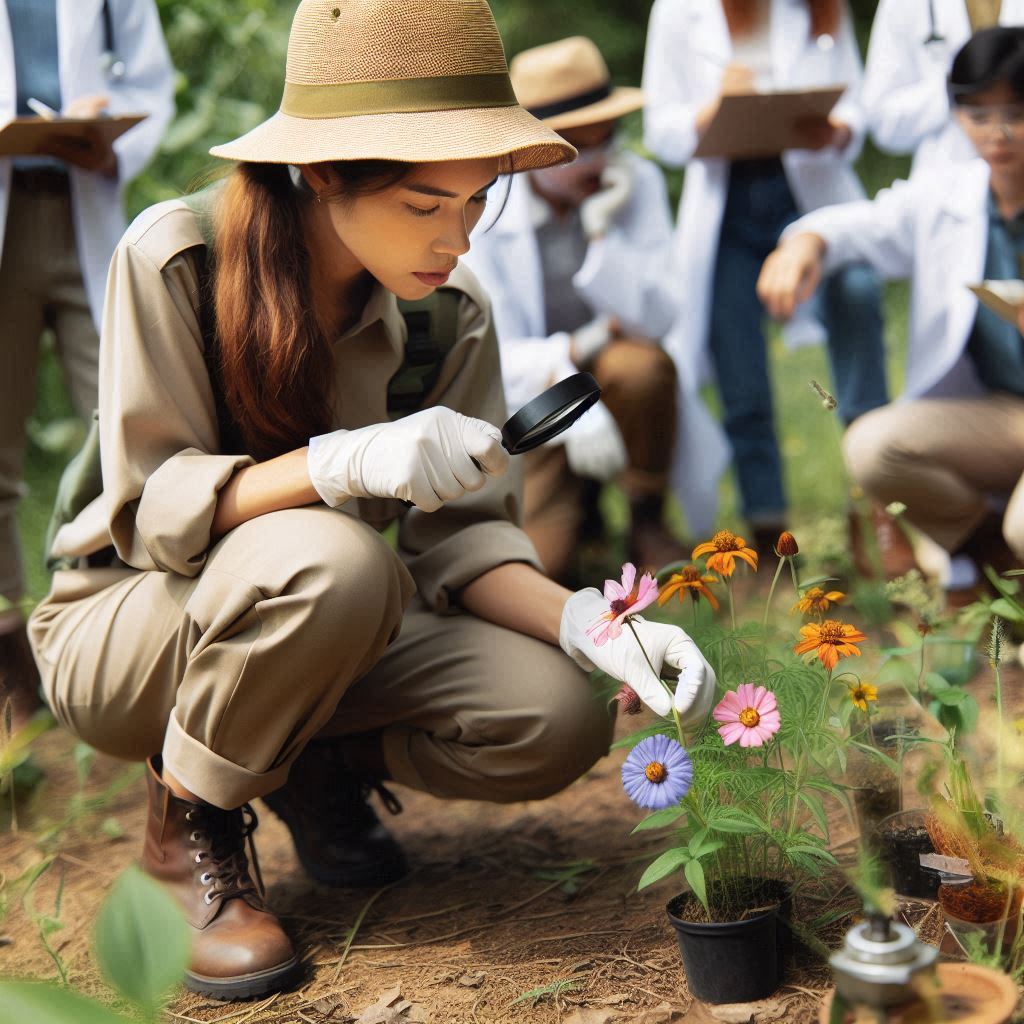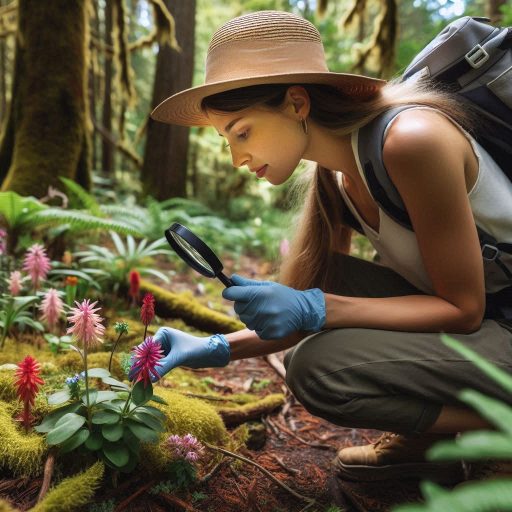Introduction
Overview of the Importance of Studying Botany
Studying botany is essential for understanding plants’ roles in ecosystems, agriculture, and medicine.
Botanists contribute to solving global issues like climate change, food security, and biodiversity conservation.
The field offers a wide range of career opportunities in research, conservation, and education.
Many universities in America provide excellent botany programs, offering specialized courses, research opportunities, and hands-on experience.
These programs equip students with the skills needed to succeed in this diverse field.
Below are some of the top universities for botany studies.
Top Universities for Botany Studies in America
- Harvard University: Harvard offers cutting-edge botanical research and a rich plant biology curriculum.
- University of California, Berkeley: Known for its strong environmental focus, UC Berkeley excels in plant ecology and conservation.
- Cornell University: Cornell provides comprehensive botany programs with opportunities in plant sciences and genetics.
- University of Wisconsin-Madison: This university is renowned for plant pathology and agricultural botany research.
These universities offer world-class education in botany, preparing students for impactful careers in plant science.
University of California, Berkeley: A Leading Institution for Botany Studies
The Botany Programs Offered at the University
The University of California, Berkeley is renowned for its exceptional botany programs.
Students can explore diverse aspects of plant biology through various undergraduate and graduate degrees offered by the Department of Integrative Biology.
Berkeley‘s botany programs emphasize a strong foundation in plant sciences, covering topics such as plant ecology, physiology, evolution, and conservation.
The curriculum encourages a hands-on approach, allowing students to participate in fieldwork and lab-based research.
Faculty Expertise and Research Opportunities
Berkeley‘s faculty in the botany department are experts in their fields, with many holding international recognition for their groundbreaking research.
Faculty members focus on key areas like plant genetics, plant-microbe interactions, and environmental plant biology.
Dr. Chelsea Specht, a leading plant evolutionary biologist, is known for her work on plant diversification and adaptation.
The diverse expertise among the faculty opens up a range of specialized courses, ensuring students have access to cutting-edge knowledge in their specific areas of interest.
Research opportunities at Berkeley are abundant, particularly for students passionate about plant science.
The university‘s close proximity to diverse ecosystems, including redwood forests and coastal wetlands, provides a unique outdoor laboratory for botany students.
Berkeley encourages students to engage in independent research, often partnering with faculty on projects funded by organizations such as the National Science Foundation.
These projects span various topics, including plant genetics, conservation, and climate change impacts on plant species.
Students gain valuable experience by participating in research that addresses real-world environmental challenges.
Any Notable Alumni in the Field of Botany
Many notable alumni in botany have emerged from Berkeley‘s programs.
One prominent example is Dr. Peter Raven, an internationally recognized botanist and conservationist.
Raven has made significant contributions to our understanding of plant biodiversity and has been an advocate for environmental conservation.
His work exemplifies the kind of impactful career that Berkeley graduates can pursue in the field of botany.
With its expert faculty, abundant research opportunities, and world-class facilities, the University of California, Berkeley remains a top choice for students pursuing botany studies.
Read: Essential Skills and Tools for Modern Chemists in America
Harvard University
The botany department at Harvard
Harvard University boasts a prestigious and innovative botany program within its Department of Organismic and Evolutionary Biology.
The department focuses on plant sciences, offering students a comprehensive understanding of botany’s various aspects.
The program encourages hands-on learning and fosters an environment where students engage in both theoretical and practical botany studies.
With an emphasis on plant diversity, evolution, ecology, and physiology, Harvard’s botany curriculum is designed to provide students with a solid foundation in the field.
The resources and facilities available for botany students
One of the standout features of Harvard‘s botany program is its access to world-class resources and facilities.
The Arnold Arboretum, a 281-acre living museum of trees, is a vital resource for botany students.
This expansive research center allows students to study plant biology in a real-world setting, observing various plant species in their natural environments.
Additionally, the Harvard University Herbaria holds over five million plant specimens from around the world, offering unparalleled opportunities for research and discovery.
Harvard’s cutting-edge research facilities also include modern labs equipped with the latest technology for plant biology experiments.
These labs are ideal for studying everything from molecular genetics to plant physiology.
Students can explore advanced microscopy, DNA sequencing, and genetic engineering techniques to analyze plant life at both macro and micro levels.
The combination of fieldwork and lab research creates a balanced approach to botany studies, preparing students for diverse careers in the field.
Groundbreaking research in botany conducted at Harvard
Harvard‘s botany program has also made significant contributions to groundbreaking research in plant science.
One notable project is the study of plant response to climate change.
Researchers at Harvard have been exploring how plants adapt to changing environmental conditions, particularly in relation to global warming.
This research has helped identify species that are more resilient to climate shifts and those that are more vulnerable.
These findings are crucial for conservation efforts and sustainable agricultural practices.
Another key area of research at Harvard involves plant genetics and the evolution of plant species.
Harvard researchers have been at the forefront of uncovering the genetic basis of plant development and diversification.
These discoveries not only deepen our understanding of plant biology but also have applications in biotechnology, including crop improvement and biofuel production.
In short, Harvard University offers botany students an exceptional educational experience through its comprehensive curriculum, access to top-tier resources, and involvement in pioneering research.
From the Arnold Arboretum to cutting-edge labs, students gain invaluable knowledge and practical skills.
Harvard‘s contributions to botanical research continue to shape the future of plant science, making it one of the top universities for aspiring botanists.
Read: The Role of Chemists in US Environmental and Sustainability Efforts
Transform Your Career Today
Unlock a personalized career strategy that drives real results. Get tailored advice and a roadmap designed just for you.
Start NowUniversity of Wisconsin-Madison
The Curriculum and Courses Available for Botany Students
The University of Wisconsin-Madison offers an excellent botany program with a diverse and comprehensive curriculum.
Botany students can explore plant biology from cellular processes to ecosystems.
The program includes foundational courses like “General Botany” and “Plant Physiology,” which provide a solid understanding of plant science.
Students can also choose specialized courses such as “Ecology of Plants,” “Plant Pathology,” and “Plant Genetics,” tailoring their education to their interests.
Advanced courses dive deeper into topics like molecular plant physiology and conservation biology, giving students hands-on research experience.
Lab-based courses like “Plant Systematics” and “Phycology” provide practical knowledge in identifying and classifying plant species.
These labs encourage students to engage directly with plant samples, fostering a deeper understanding of plant biodiversity.
Unique Field Study Opportunities
One of the standout features of UW-Madison‘s botany program is the array of unique field study opportunities.
The program encourages students to participate in fieldwork across various ecosystems, from local prairies to tropical rainforests.
Students can join faculty-led research trips to sites like the Wisconsin Arboretum, an ecological gem that provides hands-on experience in habitat restoration and plant community studies.
These field experiences are crucial for developing real-world skills in botany and environmental science.
Additionally, UW-Madison offers field courses at its Trout Lake Station in northern Wisconsin.
This field station focuses on aquatic ecosystems and plant-environment interactions.
Here, students study wetland plants, aquatic ecology, and environmental sustainability in a natural setting.
The ability to learn in diverse ecosystems allows students to apply their classroom knowledge in practical and meaningful ways.
Partnerships the University Has with Botanical Gardens or Research Institutions
UW-Madison‘s botany program benefits from strong partnerships with renowned botanical gardens and research institutions.
The university collaborates with the University of Wisconsin-Madison Botany Garden, which houses over 500 plant species from around the world.
This garden serves as both a teaching resource and research facility for students interested in plant conservation and education.
Furthermore, the university maintains connections with the United States Department of Agriculture (USDA) and the UW-Madison Herbarium.
These partnerships provide students with access to extensive plant collections and research opportunities.
Students can engage in projects related to plant taxonomy, climate change, and biodiversity, working alongside leading researchers.
In fact, the University of Wisconsin-Madison‘s botany program stands out for its rigorous curriculum, immersive field study opportunities, and valuable partnerships with botanical research institutions.
The program equips students with the skills and knowledge needed for a successful career in plant science. opportunities in the field.
Read: Day in the Life: An Environmental Scientist‘s Typical Day

Gain More Insights: Seismology Conferences and Networking Events
Uncover the Details: Exploring the History of Immunology
Find Out More: Top Universities for Studying Paleontology in the USA
Cornell University
The Interdisciplinary Approach to Botany Education at Cornell
Cornell University offers a unique interdisciplinary approach to botany education, integrating biology, ecology, and environmental sciences.
This comprehensive program prepares students for careers in botany and related fields by emphasizing both theoretical and practical knowledge.
Cornell’s Department of Plant Biology encourages students to explore the diverse aspects of plant life, from molecular biology to ecosystem dynamics.
This breadth of learning ensures students gain a holistic understanding of botany and its broader scientific connections.
Hands-on Learning Experiences for Students
Hands-on learning is a cornerstone of Cornell‘s botany education.
The university offers students numerous opportunities to work directly with plants in various environments.
The Cornell Botanic Gardens, for example, provide an ideal setting for students to study plant species, ecosystems, and conservation techniques.
These gardens serve as both a research facility and a classroom, allowing students to apply their knowledge in real-world contexts.
Field trips and outdoor labs also play a significant role, allowing students to engage with plants in natural habitats across New York State.
Cornell‘s commitment to experiential learning extends to its laboratories, where students participate in cutting-edge botanical research.
Lab-based courses encourage students to apply modern techniques such as DNA sequencing, microscopy, and data analysis to solve complex biological problems.
These practical experiences equip students with the necessary skills to excel in research or applied botany roles.
The integration of lab work and fieldwork allows students to gain a well-rounded, practical education in botany.
Collaborations with Other Departments or Institutions for Botany Research
Collaboration with other departments further enhances botany studies at Cornell.
The university encourages interdisciplinary research by fostering connections between the Plant Biology Department and other fields, such as agriculture, environmental science, and biotechnology.
For instance, students might collaborate with the Department of Biological and Environmental Engineering to develop sustainable agricultural practices.
These cross-disciplinary partnerships enrich the learning experience, exposing students to various perspectives and research methodologies.
Cornell also partners with external institutions for botany research.
The university works closely with organizations such as the Boyce Thompson Institute, a renowned plant research center located on Cornell‘s campus.
This collaboration offers students unparalleled access to advanced research facilities and opportunities to work alongside leading scientists in the field.
Such partnerships foster an environment of innovation and discovery, ensuring students are at the forefront of botanical research.
In review, Cornell University offers an interdisciplinary, hands-on approach to botany education, with extensive collaborations and research opportunities.
Students gain a broad, practical education that prepares them for successful careers in botany, ecology, and related fields.
Read: The Impact of Technology on the Chemist Profession in the US
University of Florida
Specialized Areas of Botany
The University of Florida offers a dynamic botany program with specialized areas for students to focus on.
Students can explore plant ecology, plant systematics, and evolutionary biology.
The university also provides expertise in plant physiology and molecular biology.
These areas allow students to dive deep into specific disciplines of botany, preparing them for diverse career paths.
Showcase Your Business Today
Reach thousands of readers actively exploring professional services. Publish your business profile and grow your audience now.
Publish NowUnique Research Centers and Labs
At the University of Florida, students benefit from access to unique research centers and labs within the botany department.
One notable facility is the Florida Museum of Natural History, which houses extensive plant collections.
This center gives students hands-on experience in plant taxonomy and evolutionary studies.
Another key resource is the Whitney Laboratory for Marine Bioscience, where students can study the unique relationship between marine plants and ecosystems.
These research centers offer cutting-edge tools and support for advancing botany research.
In addition, the university‘s Botany department collaborates with the University of Florida‘s Institute of Food and Agricultural Sciences (IFAS).
This partnership provides students with opportunities to participate in applied research on plant diseases, crop science, and sustainable agriculture.
IFAS gives students real-world experience in agriculture and conservation, further enhancing their learning.
Career Opportunities for Botany Graduates
Botany graduates from the University of Florida can pursue various career paths.
Many graduates find roles in environmental consulting, working on projects related to habitat restoration and conservation.
Others enter the agricultural sector, focusing on plant breeding or crop management.
With the university‘s strong ties to the Florida agricultural industry, students often secure internships and job placements with local companies.
Additionally, the university‘s career center helps connect students with opportunities in research institutions, government agencies, and nonprofit organizations.
The University of Florida also prepares graduates for advanced academic pursuits.
Many botany graduates continue their education in graduate programs, specializing in areas such as plant pathology or ecological conservation.
The program‘s research-oriented curriculum, combined with hands-on experience in the labs and fieldwork, equips students for success in academia or research-based roles.
Graduates from the botany program at the University of Florida are highly sought after.
With a combination of academic excellence, practical research experience, and strong career support, students are well-prepared for the professional world.
The university‘s focus on interdisciplinary research in botany opens doors to numerous opportunities in science, agriculture, and conservation.
Essentially, the University of Florida provides a comprehensive botany program with unique research facilities and a strong career support system.
Its specialized areas of study and hands-on research opportunities prepare students for successful careers in botany.
You Might Also Like: Space Science: From Earth Observation to Deep Space
Delve into the Subject: Marine Biology Research in Marine Mammals
Conclusion
Several universities stand out for their exceptional botany programs in America.
The University of California, Berkeley, leads the way with its renowned faculty and extensive research opportunities.
Harvard University offers a rich history in plant studies and access to vast botanical gardens.
University of Florida excels in tropical plant research and innovative approaches to agriculture.
North Carolina State University provides a strong focus on plant genetics and crop science.
Lastly, the University of Wisconsin-Madison is known for its comprehensive curriculum and vibrant botanical community.
Aspiring botanists should seriously consider these institutions for their academic journey.
Each university provides unique resources and opportunities for growth.
By choosing one of these top programs, students can develop essential skills and knowledge.
These institutions offer hands-on experiences that are vital for success in the field.
Moreover, they provide access to leading experts in botany and related sciences.
Studying botany is not just an academic pursuit; it has significant implications for our world.
Botanists play a crucial role in addressing environmental challenges.
They contribute to the conservation of plant species and ecosystems.
Through research, they develop sustainable practices that benefit agriculture and food security.
Their work also helps combat climate change by enhancing our understanding of plant responses.
[E-Books for Sale]
The Big Book of 500 High-Paying Jobs in America: Unlock Your Earning Potential
$19.99 • 500 High-Paying Jobs • 330 pages
Explore 500 high-paying jobs in America and learn how to boost your career, earn more, and achieve success!
See All 500 High-Paying Jobs of this E-Book
1001 Professions Without a Degree: High-Paying American Jobs You Can Start Now
$19.99 • 1001 Professions Without a Degree • 174 pages
Discover 1001 high-paying jobs without a degree! Unlock career tips, skills, and success strategies for just $19.99!




